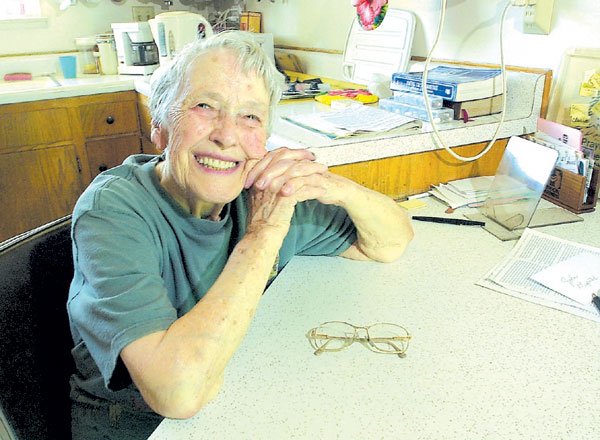GILROY
– When Florence Trimble was a young girl and a minister’s
daughter growing up in western Kansas, sometimes her dad didn’t
have money to give her for the picture show.
GILROY – When Florence Trimble was a young girl and a minister’s daughter growing up in western Kansas, sometimes her dad didn’t have money to give her for the picture show.
Yet, homeless men fresh from the boxcars at the nearby railroad track would often eat at the family’s kitchen table or receive clothing handouts from Trimble’s mother.
As a mother herself later in life, Trimble and her husband – also a minister – raised five children in a two-bedroom parsonage. But they still found enough room to permanently adopt a refugee boy from war-torn Europe.
So years later in the mid-1980s when Trimble – then in her 70s – heard the call for volunteers for a new homeless shelter at the Gilroy National Guard Armory, making the walk a few blocks down a darkened Wren Avenue to lend a hand seemed, well, natural.
Trimble stayed on to become a legendary fixture at the Armory and in local homeless advocacy efforts, ensuring the shelter had enough properly trained volunteers to greet clients with compassion and caring for nearly 15 years before her failing eyesight and hearing caught up with her.
Now 92 and fighting off more serious health problems, she spends much of her energy working on memoirs and a family history for her children – memoirs that are likely to be rich with tales of the goodness of the human soul.
“There are lots of good people in this world, and I’ve been surrounded by them my whole life,” the articulate, strong-voiced woman said during an interview in the kitchen of the bright-yellow north Gilroy ranch home she still lives in. “It’s hard for me to think of a lot of wickedness in the world because I haven’t had to be confronted by it directly.
“I’ve always lived with good people and learned from many wonderful folks.”
The lessons started early in life. Trimble’s family helped the homeless ever since she can remember as a little girl growing up in rural Kansas. It was before the Great Depression wracked the country, but conditions in the town didn’t exactly mimic Park Avenue.
“Everyone was poor. No one had much money,” she said. “We didn’t have two cents to rub together, but we had our dignity.”
Nevertheless, Trimble remembers her parents would help feed the hobos that would come from the nearby railroad line that ran through town. Many were refugees from the urban slums and some simply plain drifters. Her mother would bring them to the kitchen table and feed them, asking for a small chore in return. No one went away hungry.
“I can remember as a child one time something came up, I guess I needed a dime or something, and Daddy didn’t have it,” she recalled. “I asked, ‘Are we poor?’
“He said, ‘Of course we’re not poor Florence. Poor people are the ones that don’t have anything to share with other people. You know your mother gives out clothes, and she gives out food to people.
” ‘We’re not poor, we’re rich. We’ve got extra.’ ”
The lesson stuck.
“I’ve been rich all my life,” Trimble said. “I’ve always had more than I’ve had to keep.”
After attending college, Trimble taught high school before marrying her husband, who also preached in Kansas. When they moved to California with their five children in the late 1940s to help ease his chronic bronchitis, their new home was a two-bedroom parsonage in the San Joaquin Valley. Trimble’s husband screened off the porch to make a dormitory for their four boys.
But the small house seemed like a mansion compared to the plight of refugees from the devastation in the aftermath of World War II. The Trimbles soon agreed to take in a homeless boy from Holland, who stayed with them through college.
“He’s become an upstanding American citizen, much starchier and conservative than I am,” she laughs in a loud chuckle full of vibrancy.
The Trimbles helped other refugees on a shorter-term basis as well. And after moving to Gilroy in the 1970s, they also took in Vietnamese refugees.
“They needed a home is all, and we had space to share,” she said.
After her husband passed away and the Armory shelter – a seasonal facility that provides sleeping mats and hot meals during cold winter months – opened up, going there to help out seemed natural. Trimble remembers a chaotic scene after walking the few blocks down Wren Avenue to the building on its opening night.
“They really needed help,” she laughs. “No one knew what was happening, really. We were all going in circles frantically, but we welcomed the people that came.”
Trimble faithfully transcribed and alphabetized handwritten lists of the homeless that came there until she eventually employed the help of a computer.
“Of course, there was such rapid turnover that I had to keep making new lists all the time,” she said. “It got quite complicated eventually.”
She undertook the job of ensuring at least two people could man the front desk each night the facility was open, often stepping in as a filler or coming to the shelter anyway to ensure things ran smoothly. It was a responsibility she kept for more than a decade.
“I remember talking to a naive person about the Armory and telling them I was going over on a Saturday night,” Trimble recalled. “She said, ‘You work there on weekends?’
“I said, ‘People get hungry and need shelter Saturday, Sunday and every holiday.’ ”
It took special care to choose people with the right amount of tact to ask the oft-delicate questions needed to collect data that kept funding for the center flowing in.
“You needed to know how to approach people and not run roughshod over them,” she said. “These people had suffered enough rejection and hardship through the days. They deserved to be greeted with smiling faces and compassionate hearts.
“The thing people truly can’t seem to get through their heads are that the homeless are not a separate, distinct part of the population,” Trimble said. “They’re our friends and neighbors. They could very well be our relatives. It could happen in any family.”
In fact, Trimble recalls one of her own family members almost faced homelessness, but was lucky enough to be close to friends and relatives who could help out. But in today’s more disconnected society, people seem to increasingly lack the nearby parents, in-laws or to provide assistance.
“There was a time when a single mother with little children would not be so alone as they often are now,” she said. “We don’t have those things for many people anymore.”
The Bay Area housing market is also part of the problem, Trimble said – although in her worldview, there is plenty of space.
“A family who lives in three or four bedrooms sometimes figures they can’t possibly take in another (person),” she laughs.
Trimble retired from the front-desk job at age 90 as time took its toll on her hearing, vision and stamina. Now she keeps in touch through other longtime volunteers like Maria Skoczylas.
“Somehow, it had become a farther walk for me, and the evenings are not my favorite time – I was tired now and needed to go to bed,” she said. “I’m not as strong as I once was, but I’m thankful I had the strength I needed, and had such wonderful people who have continued to work there.”
There is both sadness and joy in the memories of serving the homeless. Trimble recalls one man who used to sleep with other homeless he’d befriended behind a local restaurant. Stricken and hospitalized with a major illness, he became hospitalized, but left doctors’ care to return to the site and spend his last days with his old friends.
They’d been chased away, and he died there alone.
Other memories are brighter. Some shelter clients have returned to thank Trimble and other volunteers after getting back on their feet. One couple that met at the shelter returned for a wedding, another to show off their new baby.
But overall, there aren’t many that come back or keep in touch.
“That’s all right,” Trimble said. “We didn’t do it for the thanks, you know.”













